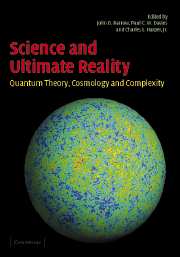Book contents
- Frontmatter
- Contents
- List of contributors
- Foreword
- Editors' preface
- Preface
- Acknowledgments
- Part I An overview of the contributions of John Archibald Wheeler
- Part II An historian's tribute to John Archibald Wheeler and scientific speculation through the ages
- Part III Quantum reality: theory
- Part IV Quantum reality: experiment
- Part V Big questions in cosmology
- Part VI Emergence, life, and related topics
- Appendix A Science and Ultimate Reality Program Committees
- Appendix B Young Researchers Competition in honor of John Archibald Wheeler for physics graduate students, postdoctoral fellows, and young faculty
- Index
Editors' preface
Published online by Cambridge University Press: 29 March 2011
- Frontmatter
- Contents
- List of contributors
- Foreword
- Editors' preface
- Preface
- Acknowledgments
- Part I An overview of the contributions of John Archibald Wheeler
- Part II An historian's tribute to John Archibald Wheeler and scientific speculation through the ages
- Part III Quantum reality: theory
- Part IV Quantum reality: experiment
- Part V Big questions in cosmology
- Part VI Emergence, life, and related topics
- Appendix A Science and Ultimate Reality Program Committees
- Appendix B Young Researchers Competition in honor of John Archibald Wheeler for physics graduate students, postdoctoral fellows, and young faculty
- Index
Summary
This book project began as part of a special program, Science and Ultimate Reality, developed in honor of the ninetieth birthday of renowned theoretical physicist John Archibald Wheeler. Having long yearned for a comprehensive, integrated understanding of the nature of the universe, Wheeler has blended scientific rigor with an unusually adventurous approach to research in physics and cosmology over a career spanning almost 70 years. Known for investigating many of the most fundamental and challenging issues in physics, Wheeler has often worked at the frontiers of knowledge where science and philosophy meet, probing the deep nature of physical reality. His vision, shaped in part by his influential mentor Niels Bohr, still flourishes today amid ongoing research activities pursued by several generations of those he has influenced over the course of much of the twentieth century.
With Wheeler as its inspiration, the Science and Ultimate Reality program was developed with a focus on the future. It brought together a carefully selected group of outstanding contemporary research leaders in the physics community to explore the frontiers of knowledge in areas of interest to Wheeler and to map out major domains and possibilities for far-reaching future exploration. Its two principal components – (1) this book and (2) a previously held symposium – were developed to take Wheeler's vision forward into a new century of expanding discovery.
- Type
- Chapter
- Information
- Science and Ultimate RealityQuantum Theory, Cosmology, and Complexity, pp. xiii - xviPublisher: Cambridge University PressPrint publication year: 2004



